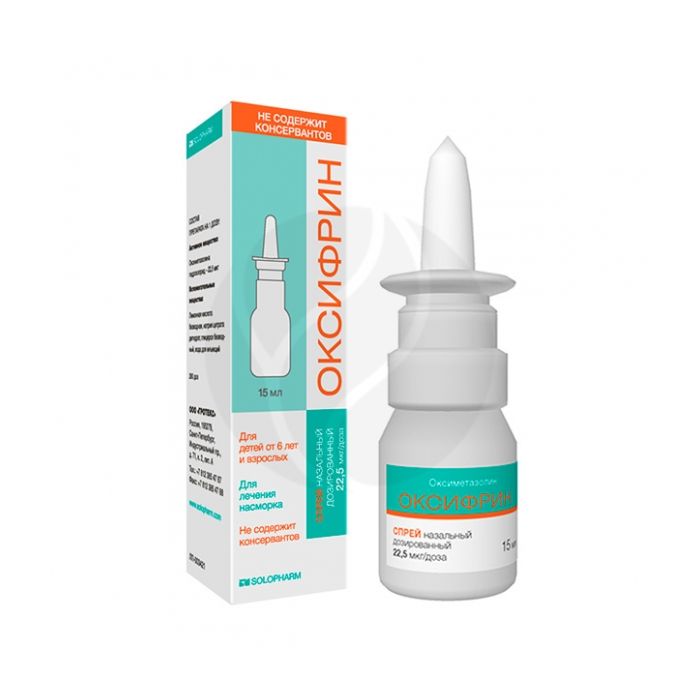Oxyphrin nasal spray 22.5 mcg / dose, 15 ml
Expiration Date: 11/2025
Russian Pharmacy name:
Оксифрин спрей назальный 22.5мкг/доза, 15 мл
Difficulty in nasal breathing with colds, sinus inflammation, eustachitis, hay fever, allergic rhinitis, congestion and conjunctival edema.
Intranasally.
Adults and children over 6 years old : 1 injection of Oxyfrin nasal spray dosed at 225 mcg / dose in each nostril 2-3 times a day.
If the symptoms worsen or the improvement does not occur within 3 days, you should consult your doctor. In the recommended dose, without consulting a doctor, use for no more than 7 days.
Doses higher than recommended can only be used under medical supervision.
With frequent and prolonged use of the drug, the nasal congestion sensation may reappear or worsen. If these symptoms appear, you should stop treatment and consult a doctor.
One 45 ?L injection contains:
- 225 mcg oxymetazoline hydrochloride - for Oxyfrin nasal spray dosed at 225 mcg / dose.
Dosed nasal spray in the form of a clear or almost transparent liquid from almost colorless to light yellow.
1 dose of oxymetazoline hydrochloride 22.5 mcg
Excipients : anhydrous citric acid - 25.065 mcg, sodium citrate dihydrate - 172.035 mcg, anhydrous glycerol - 952.425 mcg, d / i water - 43.839 mg.
Inflammation of the mucous membrane of the nasal passages without secretion,
chronic heart failure
hyperthyroidism,
diabetes,
pregnancy,
children under 6 years of age (for eye drops),
hypersensitivity to oxymetazoline,
atrophic rhinitis,
lactation period,
arrhythmias,
severe atherosclerosis,
arterial hypertension,
Chronic renal failure,
angle-closure glaucoma.
Release form, packaging and composition of the drug Oxyfrin
Dosed nasal spray in the form of a clear or almost transparent liquid from almost colorless to light yellow.
1 dose of oxymetazoline hydrochloride -22.5 mcg
Excipients : anhydrous citric acid - 25.065 mcg, sodium citrate dihydrate - 172.035 mcg, anhydrous glycerol - 952.425 mcg, d / i water - 43.839 mg.
Clinical and pharmacological group: Vasoconstrictor drug for local use in ENT practice
Pharmaco-therapeutic group: Decongestant - alpha-adrenergic agonist
pharmachologic effect
Adrenomimetic agent for topical use. Has a vasoconstrictor effect. With intranasal administration, the swelling of the mucous membrane of the upper respiratory tract decreases. When instilled into the conjunctival sac, it reduces the swelling of the conjunctiva.
Pharmacokinetics
The effect is manifested 15 minutes after application and lasts for 6-8 hours.
Indications of the active substances of the drug Oxyfrin
Difficulty in nasal breathing with colds, sinus inflammation, eustachitis, hay fever, allergic rhinitis, congestion and conjunctival edema.
Dosage regimen
Intranasally.
Adults and children over 6 years old : 1 injection of Oxyfrin nasal spray dosed at 225 mcg / dose in each nostril 2-3 times a day.
If the symptoms worsen or the improvement does not occur within 3 days, you should consult your doctor. In the recommended dose, without consulting a doctor, use for no more than 7 days.
Doses higher than recommended can only be used under medical supervision.
With frequent and prolonged use of the drug, the nasal congestion sensation may reappear or worsen. If these symptoms appear, you should stop treatment and consult a doctor.
One 45 ?L injection contains:
- 225 mcg oxymetazoline hydrochloride - for Oxyfrin nasal spray dosed at 225 mcg / dose.
Side effect
On the part of the respiratory system: transient dryness and burning sensation of the nasal mucosa, dry mouth and throat, sneezing are possible; with prolonged use, the appearance of reactive hyperemia of the mucous membrane, atrophy of the mucous membrane is possible.
On the part of the cardiovascular system: palpitations; rarely - arterial hypertension.
From the side of the central nervous system: increased excitability, dizziness, headache, sleep disturbances; with prolonged use - tachyphylaxis.
From the digestive system: nausea.
From the side of the organ of vision: with conjunctival administration, mydriasis, paresis of accommodation, irritation of the conjunctiva and surrounding tissues, eyelid retraction are possible.
Contraindications for use
Inflammation of the mucous membrane of the nasal passages without secretion, chronic heart failure, hyperthyroidism, diabetes mellitus, pregnancy, children under 6 years of age (for eye drops), hypersensitivity to oxymetazoline, atrophic rhinitis, lactation period, arrhythmias, severe atherosclerosis, arterial hypertension, CRF, angle-closure glaucoma.
Application during pregnancy and lactation
Oxymetazoline is contraindicated during pregnancy and lactation (breastfeeding).
Application for impaired renal function
Contraindicated in chronic renal failure.
Application in children
Contraindicated in children under 6 years of age (for eye drops).
special instructions
In the recommended dosage, without consulting a doctor, you can use it for no more than 3 days. Avoid getting the drug intended for intranasal administration in the eyes.
Influence on the ability to drive vehicles and use mechanisms
The drug has an effect on vision, a decrease in the reaction rate is possible.
Drug interactions
With the simultaneous appointment of MAO inhibitors and tricyclic antidepressants, an increase in blood pressure is possible.
Oxymetazoline slows down the absorption of local anesthetic drugs, lengthens their effect.
The co-administration of other vasoconstrictor drugs increases the risk of side effects.

